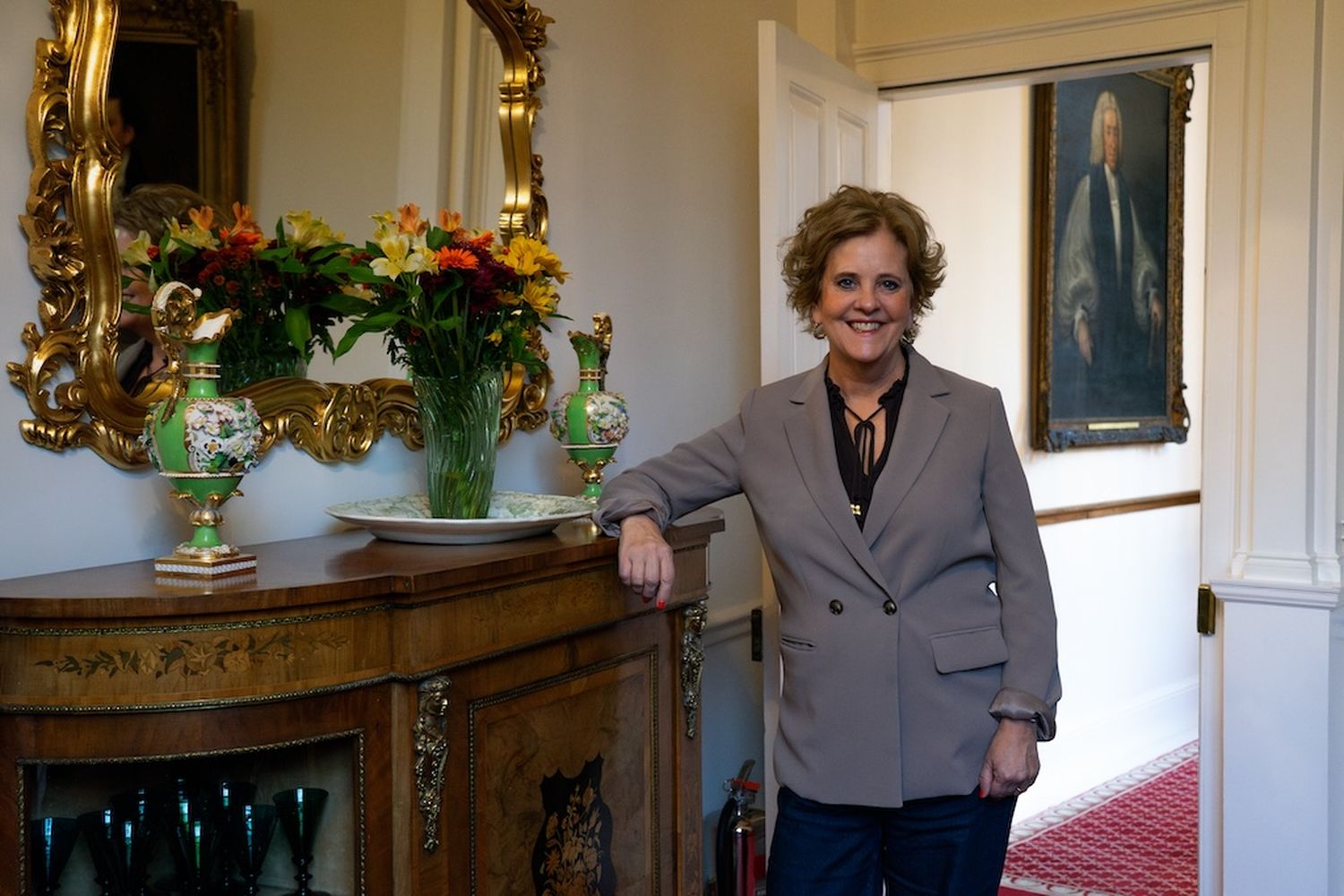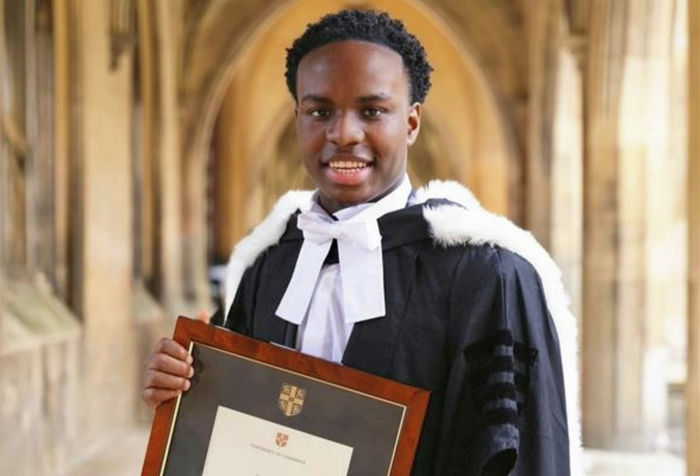In a room bedecked with portraits of men, I sit down with Dame Menna Rawlings, Queens’ College’s first female president. Despite being founded by two women – Margaret of Anjou in 1448 and Elizabeth Woodville in 1465 – the college has never seen a woman in such high office until now. Rawlings describes her presidency as “completing the circle,” which raises pointed questions about the history and future of diversity at Cambridge.
An esteemed diplomat, Rawlings joined the Foreign Office in 1989 and served as ambassador to France from 2021, before taking up her current position in the President’s Lodge at Queens’ College.
“Like a lot of young women, I lacked confidence”
Reflecting on her early education, she notes that “like a lot of young women, I lacked a lot of confidence.” Raised somewhat on the M1, back and forth between London and Wales, Rawlings was educated at her local comprehensive. She discovered an aptitude and eagerness for academics, which led her to study international relations at the London School of Economics. Rawlings describes her university experience as “brilliant” although slightly haunted by a sense of alienation – a feeling that “really affected my ability to find a voice.”
This sentiment seemed to linger, something she refers to as “the paralysis of perfectionism”. She wrestled with it for the most part of her early career. “It wasn’t until my early 30s that I really started to believe that I could be successful in my career, and be my authentic self”. From these “shaky, unsure beginnings,” she began a 36-year diplomatic career which concluded in her appointment as the first female Ambassador to France.
Rawlings has repeatedly found herself the ‘first’ woman in major institutions long built and shaped by men. I ask her how she feelings about having this ‘pioneering’ role. She admits that “part of me really loves it… but it can be quite tiring”; the novelty of female leadership entails a spotlight which attracts increased public scrutiny. When appointed ambassador to France in 2021 during a period of strained Anglo-French relations, her daughter warned her: “Mum, they’ve given you a glass cliff…” Rawlings remembers her saying, “you’ll fall off and then everyone will say that you’ve failed”. Rawlings believes that structural challenges still exist, not through overt sexism, but perpetrated by subtle, deeply embedded expectations. She draws attention to the perpetrators on social media, observing that women suffer from trolling and hate-mongering most often. Nevertheless, Rawlings insists that stepping into these roles is critical to building the resilience that is pioneering, “not just for women but for everyone who feels different.”
Our conversation turns to the value of role models: “if you can’t see it, you can’t be it”. Rawlings places particular emphasis on the weight of this visible presence “not just for women but for men to see that these are opportunities for their girlfriends, partners, sisters, in a way that was probably denied to their parent’s generation”. Sometimes the “second, third or fourth woman in that role is more important” than the pioneer to “consolidate” the permanence of change, she argues; “at some point, I hope I won’t always have to be the first.”
One of the most striking inequalities Rawlings cites in the Foreign Office, only abolished in 1973, required female diplomats to resign upon marriage. She draws a parallel to Queens’, where women were only admitted in 1980. The new president is keen to discuss her personal balance between her working roles and motherhood, recalling that when she was around 18, her own mother remarked, “I wonder if you’re going to be a career woman or a mum.” Rawlings remembers thinking that she wanted to be both. The fact that this is now possible is one of the most significant social shifts she has seen in her lifetime.
“It’s very easy to be critical of the past, but I don’t think it’s terribly productive”
Rawlings attributes these “breakthroughs” to the supportive communities that these institutions foster; certainly a response to their inherently discriminatory framework. She refers to some of the political “backlash” splintering from the Diversity, Equity and Inclusion agenda, insisting that “having the strength in numbers is really important”. It is equally crucial to see “women being successful in their own authentic way,” she stresses: “they’re not just doing jobs like men would do them, […] we are able to show what female leadership really looks like.”
I ask Rawlings about how her reflections translate to her time in Cambridge, particularly in light of Queens’ male-dominated past. “It’s very easy to be critical of the past, but I don’t think it’s terribly productive,” she tells me. As she tells me about her “full circle analogy,” she explains humorously that she mirrors the path of a woman who also arrived from France, Queens’ founder Margaret of Anjou, to take up a leadership role here. You could say that Rawlings has taken on the presidential post as it was originally conceived in full fashion, in contrast the men who have merely held the fort in the meantime. For Rawlings, her presidency is a “springboard for change” to build a resilient community both in Queens’ College and across Cambridge.
We return to the portraits around us. She observes that “there’s something about the inevitability of these buildings feeling very male” because they have historically been built and steered by men, and survive in the shadow of that past. Rawlings points to efforts, such as those at Trinity College under Sally Davies, to make women’s contributions and achievements more noticeable. Celebrating women is not only imperative but it must be visible, to “counteract the weight of history,” Rawlings stresses. She applies this to other forms of diversity too, citing a postgraduate scholarship named after Alexander Crummell, a formerly enslaved black American student and abolitionist who graduated from the college in 1853. His portraits that decorate the College walls serve as a visual reminder of his achievements.
“There’s something about the inevitability of these buildings feeling very male”
Curious about her role as a diplomat, I ask her whether she ever felt a tension between her personal identity and the government she served. Rawlings, who has worked under every administration from Thatcher to the current Labour government, acknowledges the challenge and states that she felt friction: “there are times when you can feel quite distant”. She insists that as a civil servant these feelings must take “second place”. “A moral ground for diplomacy” is imperative, she argues: “it is a duty to take a longer view,” and be “proud of the country I represent; for all its ‘warts’, it still has so much to be proud of”.
This outlook has shaped her time at Cambridge so far too. She states that some of her own prejudices upon arriving have been “dissolved quite successfully,” which she attributes to the strong community and the support that thrives within the archaic walls of Cambridge University.
When asked what advice she would give to young women, Rawlings recalls some advice she once received from the Foreign Office’s Women’s Association: “Know yourself, be yourself, back yourself”. This phrase, she says, captures the journey that took her more than a decade. She stresses that women should have the confidence and power to exist as their authentic selves, and to not allow the self-critique that has become all too common to hold them back. Rawlings insists that we women have to bring “a bit of sparkle” to demanding roles – a shine I hope we will see flicker through in her time here at Cambridge.


